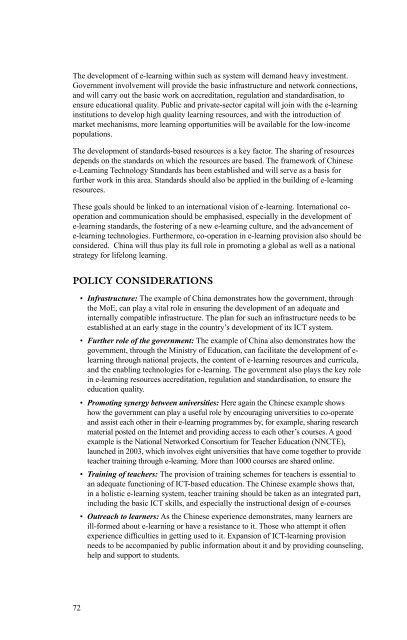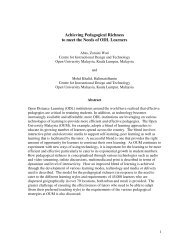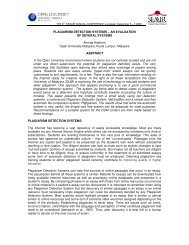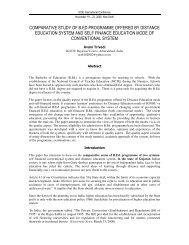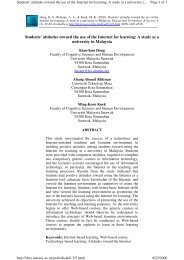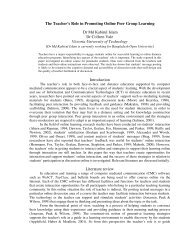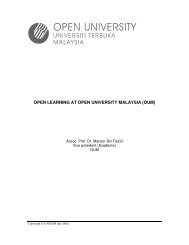lifelong learning and distance higher education - Asia Pacific Region
lifelong learning and distance higher education - Asia Pacific Region
lifelong learning and distance higher education - Asia Pacific Region
- No tags were found...
Create successful ePaper yourself
Turn your PDF publications into a flip-book with our unique Google optimized e-Paper software.
The development of e-<strong>learning</strong> within such as system will dem<strong>and</strong> heavy investment.Government involvement will provide the basic infrastructure <strong>and</strong> network connections,<strong>and</strong> will carry out the basic work on accreditation, regulation <strong>and</strong> st<strong>and</strong>ardisation, toensure <strong>education</strong>al quality. Public <strong>and</strong> private-sector capital will join with the e-<strong>learning</strong>institutions to develop high quality <strong>learning</strong> resources, <strong>and</strong> with the introduction ofmarket mechanisms, more <strong>learning</strong> opportunities will be available for the low-incomepopulations.The development of st<strong>and</strong>ards-based resources is a key factor. The sharing of resourcesdepends on the st<strong>and</strong>ards on which the resources are based. The framework of Chinesee-Learning Technology St<strong>and</strong>ards has been established <strong>and</strong> will serve as a basis forfurther work in this area. St<strong>and</strong>ards should also be applied in the building of e-<strong>learning</strong>resources.These goals should be linked to an international vision of e-<strong>learning</strong>. International cooperation<strong>and</strong> communication should be emphasised, especially in the development ofe-<strong>learning</strong> st<strong>and</strong>ards, the fostering of a new e-<strong>learning</strong> culture, <strong>and</strong> the advancement ofe-<strong>learning</strong> technologies. Furthermore, co-operation in e-<strong>learning</strong> provision also should beconsidered. China will thus play its full role in promoting a global as well as a nationalstrategy for <strong>lifelong</strong> <strong>learning</strong>.POLICY CONSIDERATIONS• Infrastructure: The example of China demonstrates how the government, throughthe MoE, can play a vital role in ensuring the development of an adequate <strong>and</strong>internally compatible infrastructure. The plan for such an infrastructure needs to beestablished at an early stage in the country’s development of its ICT system.• Further role of the government: The example of China also demonstrates how thegovernment, through the Ministry of Education, can facilitate the development of e-<strong>learning</strong> through national projects, the content of e-<strong>learning</strong> resources <strong>and</strong> curricula,<strong>and</strong> the enabling technologies for e-<strong>learning</strong>. The government also plays the key rolein e-<strong>learning</strong> resources accreditation, regulation <strong>and</strong> st<strong>and</strong>ardisation, to ensure the<strong>education</strong> quality.• Promoting synergy between universities: Here again the Chinese example showshow the government can play a useful role by encouraging universities to co-operate<strong>and</strong> assist each other in their e-<strong>learning</strong> programmes by, for example, sharing researchmaterial posted on the Internet <strong>and</strong> providing access to each other’s courses. A goodexample is the National Networked Consortium for Teacher Education (NNCTE),launched in 2003, which involves eight universities that have come together to provideteacher training through e-<strong>learning</strong>. More than 1000 courses are shared online.• Training of teachers: The provision of training schemes for teachers is essential toan adequate functioning of ICT-based <strong>education</strong>. The Chinese example shows that,in a holistic e-<strong>learning</strong> system, teacher training should be taken as an integrated part,including the basic ICT skills, <strong>and</strong> especially the instructional design of e-courses• Outreach to learners: As the Chinese experience demonstrates, many learners areill-formed about e-<strong>learning</strong> or have a resistance to it. Those who attempt it oftenexperience difficulties in getting used to it. Expansion of ICT-<strong>learning</strong> provisionneeds to be accompanied by public information about it <strong>and</strong> by providing counseling,help <strong>and</strong> support to students.72


